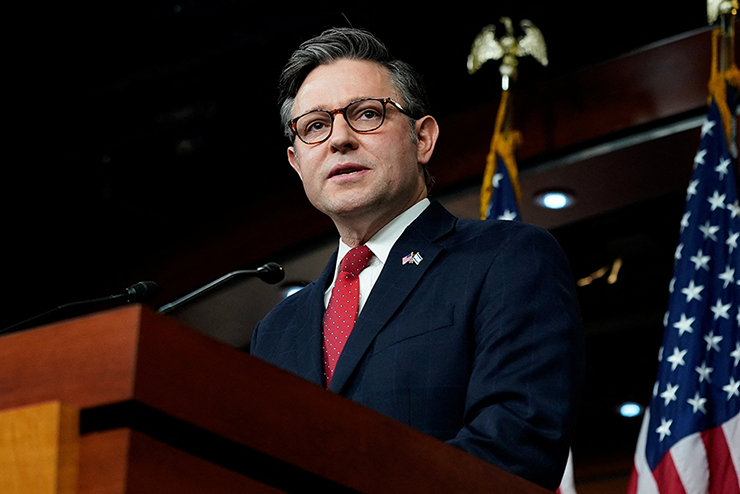Last month, U.S. House Speaker Mike Johnson, asked on Fox News how he planned to develop public policy, replied: “Well, go grab a Bible from your bookshelf and read -there. This is my view of the world.
When assuming that Johnson’s MAGA-flavored policies are based in traditional Christianity, many Christians applaud…and many non-Christians are appalled. I am a dismayed Christian because I believe Johnson and his supporters and enablers have hijacked Christian tradition.
These days it might seem that religion is inherently conservative and secularism inherently progressive, and that they are at war. But tradition is a more delicate concept than we sometimes think. The poles are defended by two of the greatest historians of Christianity: Adolf Harnack (1851-1930), “No religion gains anything through time; he only loses”; and John Henry Newman (1801-1890; since 2019, saint), “To live is to change, and to be perfect is to have changed often. »
Change as loss, change as life. This debate about change: is it the lifeblood of religion or a poison that kills it? – upsets all traditions. Once we become aware of what is at stake, we understand the ferocity of the insults, anathemas and threats circulating. Given the noise and media attention, one might conclude that the effort to prevent change is the true religious response. But there are honestly religious people who believe change is a good thing – not because they have succumbed to the blandishments of secularism, but because their traditional theology demands it. We are inspired by a line from the play “Faust” by Johann Wolfgang von Goethe (1749-1832): “What you have inherited from your ancestors, now take on as a task in order to make it your own. »
Tradition is not just something – books, stories, songs, pictures, beliefs (one of my students once wrote: “In the end, it is not intellectuals who form cultures living, they are the grandmothers) – but also a temporal framework. My sense of where we are in the narrative is very different from Mike Johnson’s. He is a strong proponent of the Ark Encounter, which presents humans and dinosaurs as contemporaries on an Earth only 6,000 years old. I’ll go for the James Webb Space Telescope, which dates back over 13 billion years, but more importantly is an experience I had almost half a century ago.
On March 26, 1975, before the age of automatic word processing, I was typing a letter, my finger slipped and the year got an extra digit. I stood frozen as 19756 catapulted me into the 198th century, of which our 2000 years of Church history would be no greater a part (10 percent) than the first 200 years are to us. . We are part of the “early church” and have as much authority over tradition, as well as responsibilities for it, as those of the first six or seven generations.
Changes over these two millennia: slavery is wrong, suicide does not automatically result in damnation, women (in some faiths) can be ordained and, very recently (including Pope Saint John Paul II), the conviction that God’s covenant with the Jews was not respected. have been replaced, so Christians no longer have a mandate to try to convert them – are simply examples of the early Church’s ability to figure out how to be faithful.
MAGA dogmas – including same-sex marriage as a threat to civilization, transgender people as an abomination, murder by abortion, immigrants as an “infection,” the United States as a Christian nation, Donald Trump as the new King Cyrus (God’s anointed from Isaiah 45) – have no exclusivity. claim to tradition. Presenting them as aligned with a “biblical worldview” – or “the biblical worldview” – is to encapsulate a collection of texts that raise as many questions for each answer as there are answers for each question.
While some Christians believe that an “atheist culture” threatens a “church under siege”, other Christians, who expect God (Creator of all things) to be as active outside as inside within the Church, believe that culture moves the Church to a deeper understanding of what it means that we are all created in the image of God.
Patrick Henri
In 1799, Friedrich Schleiermacher (1768-1834) published “On Religion: Discourse to Its Cultivated Despisers.” Two and a quarter centuries later, we need its mirror image: “On culture: speech to its religious detractors”. This is not the task of a single author or a single book, and certainly not just teachers. I appeal to all Christians – Anglicans, Catholics, Orthodox, Protestants – lay and clergy, for whom progressive change is a theological mandate, classically expressed by the poet Gerard Manley Hopkins (1844-1889): “The world is loaded of the greatness of God. »: write letters, essays, articles, books, poems, plays, screenplays; compose, draw, choreograph, sculpt; give lectures, lead discussion groups, give courses, participate in talk shows, blog; support liberal church councils and seminaries – whatever it takes, whatever you can do. Denounced? (I was asked to enjoy my “trip on the train to hell.”) Don’t flinch. Our claim to tradition is second to none.
Patrick Henry, who lives in Waite Park, is retired executive director of the Ecumenical and Cultural Research Institute in Collegeville. His personal website is www.IronicChristian.org.


